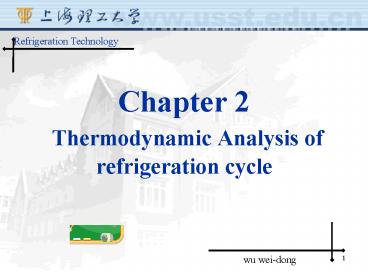Chapter 2 Thermodynamic Analysis of refrigeration cycle - PowerPoint PPT Presentation
1 / 27
Title:
Chapter 2 Thermodynamic Analysis of refrigeration cycle
Description:
Refrigeration Technology Chapter 2 Thermodynamic Analysis of refrigeration cycle wu wei-dong Chapter 2 Thermodynamic Analysis of refrigeration cycle Refrigeration ... – PowerPoint PPT presentation
Number of Views:756
Avg rating:3.0/5.0
Title: Chapter 2 Thermodynamic Analysis of refrigeration cycle
1
Chapter 2 Thermodynamic Analysis of
refrigeration cycle
Refrigeration Technology
wu wei-dong
2
Refrigeration Technology
Chapter2 Thermodynamic Analysis of refrigeration
cycle
Chapter 2 Thermodynamic Analysis of
refrigeration cycle
- The Laws of Thermodynamics and Their Relation to
Refrigeration - The Refrigeration Cycle and its Main Components
- The Performance of Refrigeration System
- Entropy Analyses method of Refrigeration System
- Work and Heat Operated Refrigerators
- Lorenz Cycles for Variable Temperature Heat
Source and Heat Sink - REFERENCES
wu wei-dong
3
Refrigeration Technology
Chapter2 Thermodynamic Analysis of refrigeration
cycle
The Laws of Thermodynamics and Their Relation to
Refrigeration
wu wei-dong
4
Refrigeration Technology
Chapter2 Thermodynamic Analysis of refrigeration
cycle
- (1)The 0th Law of Thermodynamics
- The Zeroth Law of Thermodynamics states
- (1)If two systems are each equal in
temperature to a third system, then the
temperatures of the two systems themselves are
equal. - (2)If two closed systems (together
isolated), with different temperatures are
brought into thermal contact, then the
temperatures of the two systems will change to
approach the same temperature. That is, the
temperature of the system which is at a higher
temperature will decrease and the temperature of
the system with the lower temperature will
increase. They will eventually have the same
temperature.
wu wei-dong
5
Refrigeration Technology
Chapter2 Thermodynamic Analysis of refrigeration
cycle
- (2)The 1st Law of Thermodynamics
- The First Law of Thermodynamics involves the
conservation of energy. It states - The energy of an isolated system remains
constant. - The First Law of Thermodynamics can be expressed
as a mathematical interpretation as
wu wei-dong
6
Refrigeration Technology
Chapter2 Thermodynamic Analysis of refrigeration
cycle
(3)The 2nd Law of Thermodynamics There are
several alternate but equivalent ways to describe
the 2nd Law 1. Heat Transfer Heat flows
spontaneously from a hot body to a cool body in
absence of other effects, not the opposite. 2.
Mass Transfer Fluid flows spontaneously from a
high pressure to low pressure in absence of other
effects, not the opposite. 3.Diffusion Two
gases, when placed in an isolated chamber, will
mix uniformly throughout the chamber, but will
not separate spontaneously once mixed. 4.It is
impossible to convert heat completely into useful
work. 5.For an isolated system, any change over
time of entropy S is either positive or zero,
that is
wu wei-dong
7
Refrigeration Technology
Chapter2 Thermodynamic Analysis of refrigeration
cycle
(4) The 3rd Law of Thermodynamics There are
several alternate but equivalent ways to describe
the 3rd Law 1.The entropy of any pure substance
in thermodynamic equilibrium approaches zero as
the absolute temperature approaches zero 2.It is
impossible to cool a body to absolute zero by any
finite process. Although one can approach
absolute zero as closely as one possible, one
cannot actually reach this limit.
wu wei-dong
8
Refrigeration Technology
Chapter2 Thermodynamic Analysis of refrigeration
cycle
The Refrigeration Cycle and its Main Components
wu wei-dong
9
Refrigeration Technology
Chapter2 Thermodynamic Analysis of refrigeration
cycle
- Fig.2-1 illustrates a refrigerator operating in a
thermodynamic cycle. There are a refrigerator and
two heat reservoirs (a hot heat reservoir with
temperature TH and a cold heat reservoir with
temperature Tc ) to make up of the heat transfer
process from low temperature Tc to high
temperature TH .
wu wei-dong
10
Refrigeration Technology
Chapter2 Thermodynamic Analysis of refrigeration
cycle
- (1)Heat reservoirs---heat source and heat sink
- A heat reservoir is a sufficiently large system
in stable, to which and from which finite amounts
of heat can be transferred without any change in
the temperature of the heat reservoir A heat
source is a heat reservoir from which heat is
transferred. - A heat sink is a heat reservoir to which heat is
transferred.
wu wei-dong
11
Refrigeration Technology
Chapter2 Thermodynamic Analysis of refrigeration
cycle
- (2)Refrigeration cycle
- As the refrigerator cycle is referred to as the
system, and the two heat reservoirs as the
environment, when the system has completed a
refrigeration cycle, it has undergone a series of
processes and returned to its original state. - All the parameters (such as pressure P,
temperature T) and all the thermal properties
(such as enthalpy h, entropy s, inner energy u)
of the refrigerant at the end of the cycle are
the same as they are at the beginning
wu wei-dong
12
Refrigeration Technology
Chapter2 Thermodynamic Analysis of refrigeration
cycle
- (3)Main Components of vapor compression
Refrigeration cycle - The refrigeration cycle shown in Fig.2-1 is
called































